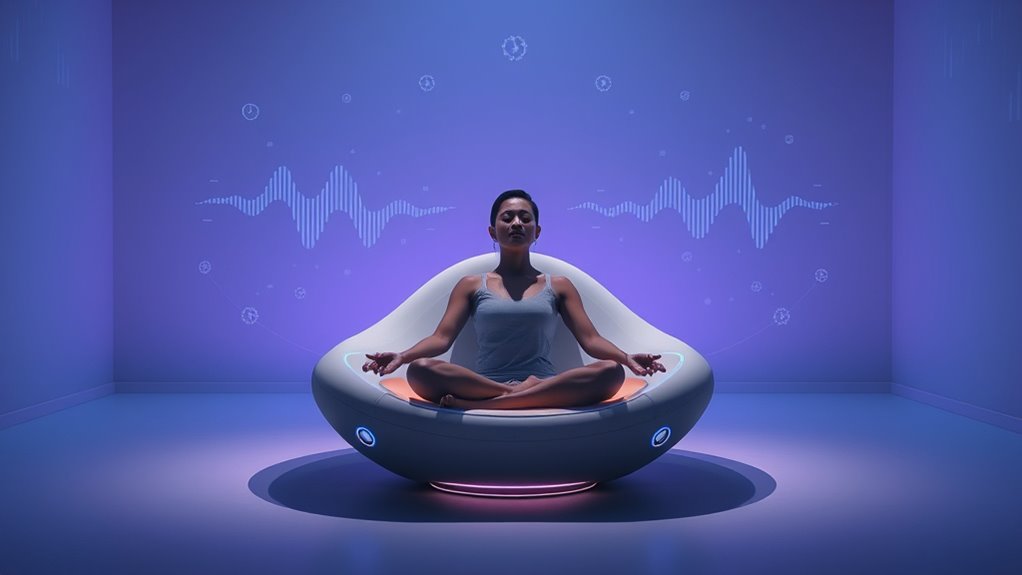AI is transforming mindfulness with personalized, adaptive meditation guides that respond to your mood, stress, and preferences in real time. You can access immersive experiences through virtual reality, voice-activated commands, and wearable devices that monitor your physiological state. This technology makes mindfulness more accessible and tailored for everyone, from busy professionals to beginners. Keep exploring to discover how these innovations are shaping the future of mindful living and well-being.
Key Takeaways
- AI-driven personalization tailors meditation sessions based on individual mood, stress levels, and physiological data for enhanced effectiveness.
- Integration of virtual reality and augmented reality creates immersive, sensory-rich mindfulness environments tailored to user preferences.
- Voice-activated and conversational AI guides enable seamless, real-time interaction, making meditation more accessible and engaging.
- Wearables and biosensors provide real-time physiological feedback, allowing dynamic adjustment of meditation techniques.
- Data analytics and community features foster personalized insights, social support, and long-term engagement in mindfulness practices.
The Evolution of Meditation With Artificial Intelligence
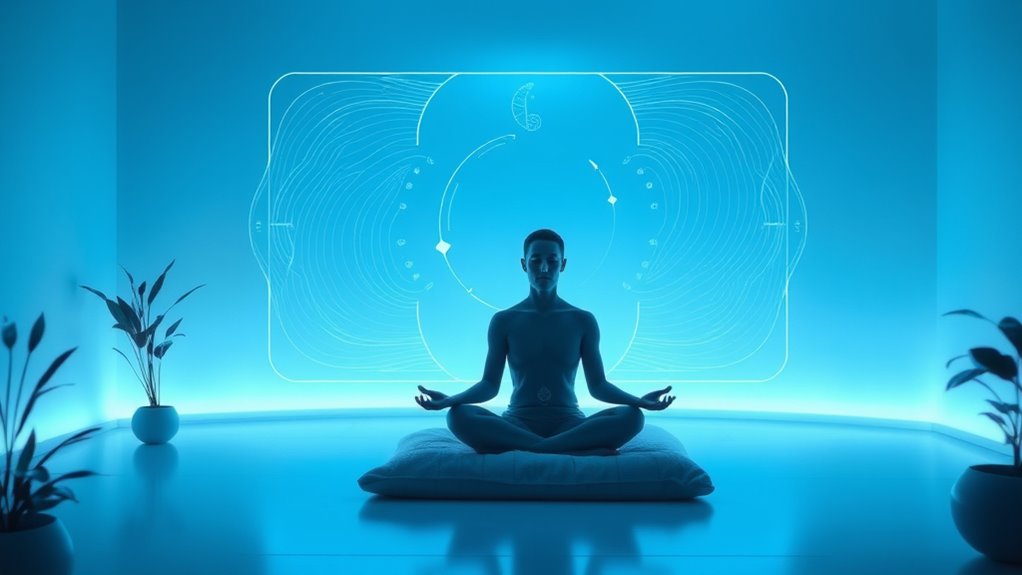
As artificial intelligence advances, it’s transforming the way we practice meditation by offering personalized guidance and real-time feedback. Instead of following generic recordings, you now get tailored sessions that adapt to your mood, breathing patterns, and stress levels. AI-driven apps analyze your responses and modify instructions instantly, helping you stay focused and deepen your practice. This evolution means meditation becomes more accessible and effective, especially for beginners or those with busy schedules. You no longer need a teacher or group setting; AI provides a constant, customizable companion. Over time, this technology refines your practice, making mindfulness more engaging and impactful. The shift from static methods to dynamic, responsive tools marks a significant step forward in meditation’s evolution. Additionally, advancements in AI are enabling new research strategies that could further enhance personalized wellness experiences. These innovations are also contributing to improved sensor technology, allowing more precise monitoring of physiological signals during meditation sessions. This synergy between AI and personalized wellness underscores a future where mindfulness practices are increasingly tailored to individual needs. Furthermore, integrating data from juice cleanses and detox can offer holistic insights into one’s health and well-being, fostering more comprehensive mindfulness approaches.
Personalization and Customization in AI Meditation Apps
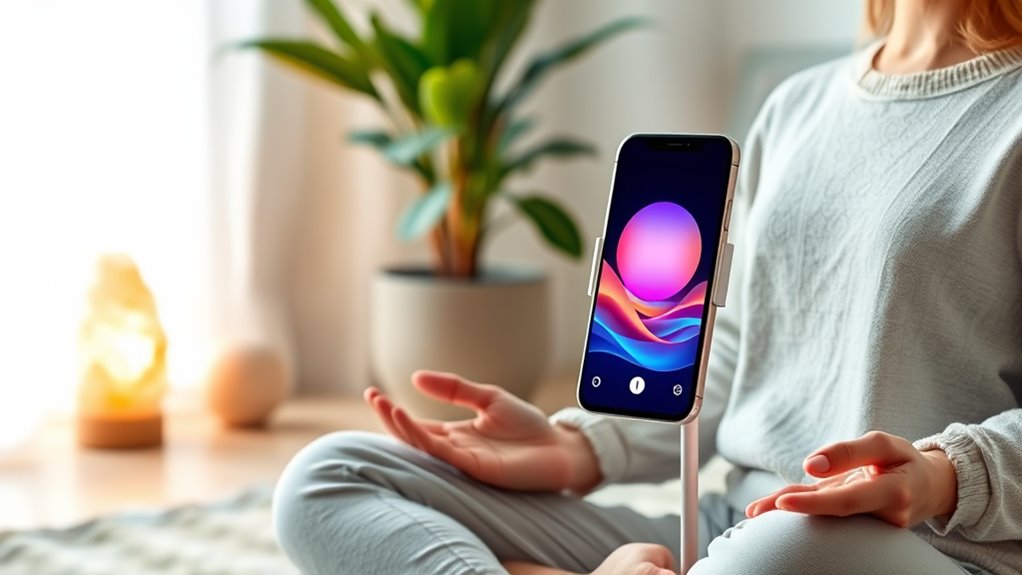
You can now experience meditation apps that adapt to your unique needs, offering tailored sessions that suit your mood and goals. These apps learn your preferences over time, creating a more personalized journey. As a result, your practice becomes more engaging and effective. Additionally, integrating personality insights can further enhance the customization process, making sessions more aligned with your emotional and mental state. Employing predictive modeling can help these apps anticipate your needs and adjust content proactively for optimal benefit. The use of skin health information, such as understanding your skin’s hydration levels, can also inform the app’s suggestions for relaxation techniques that promote overall well-being. Incorporating mindfulness techniques that target physical sensations can deepen your relaxation experience and improve body awareness.
Tailored Meditation Experiences
Personalization has become a cornerstone of effective AI meditation apps, allowing you to craft experiences that match your unique needs and goals. Tailored meditation experiences go beyond basic customization, providing sessions designed specifically for your current mood, stress levels, or time constraints. AI analyzes your usage patterns and feedback to refine future sessions, ensuring relevance and engagement. This approach boosts your motivation and helps you achieve desired outcomes faster. Consider how different meditation types suit various needs:
| Meditation Type | Focus Area | Ideal For |
|---|---|---|
| Body Scan | Relaxation, body awareness | Stress relief |
| Breathwork | Focus, calmness | Anxiety management |
| Loving-kindness | Compassion, emotional balance | Relationship improvement |
| Guided Visualization | Creativity, mental clarity | Goal setting |
This customization makes each session more effective and aligned with your personal journey. Additionally, personalized feedback plays a crucial role in enhancing the effectiveness of your meditation practice by continuously adapting to your evolving needs. Incorporating filtering technologies can further optimize your experience by tailoring the session environment to your preferences and sensitivities. Moreover, understanding the various meditation types and their specific benefits can help you select the most suitable approach for your goals. Recognizing the importance of AI-driven personalization can significantly improve the overall success of your meditation routine.
Adaptive User Preferences
Because AI meditation apps continuously learn from your interactions, they can adapt preferences in real-time to suit your evolving needs. As you use the app, it tracks your responses, progress, and feedback, adjusting session types, durations, and techniques accordingly. If you prefer shorter sessions during busy days or more in-depth practices when you need deeper focus, the app makes those changes automatically. It also recognizes patterns in your mood or stress levels, tailoring content to help you manage specific emotions. This dynamic customization guarantees every session feels relevant and effective, increasing engagement and progress. Additionally, by analyzing your usage patterns, these apps can incorporate personalization strategies and entertainment and parks insights to offer more personalized recommendations, ensuring your meditation experience remains aligned with your lifestyle and mental state. Incorporating user data security practices helps maintain your privacy while optimizing these tailored experiences.
Data-Driven Insights and User Feedback Integration
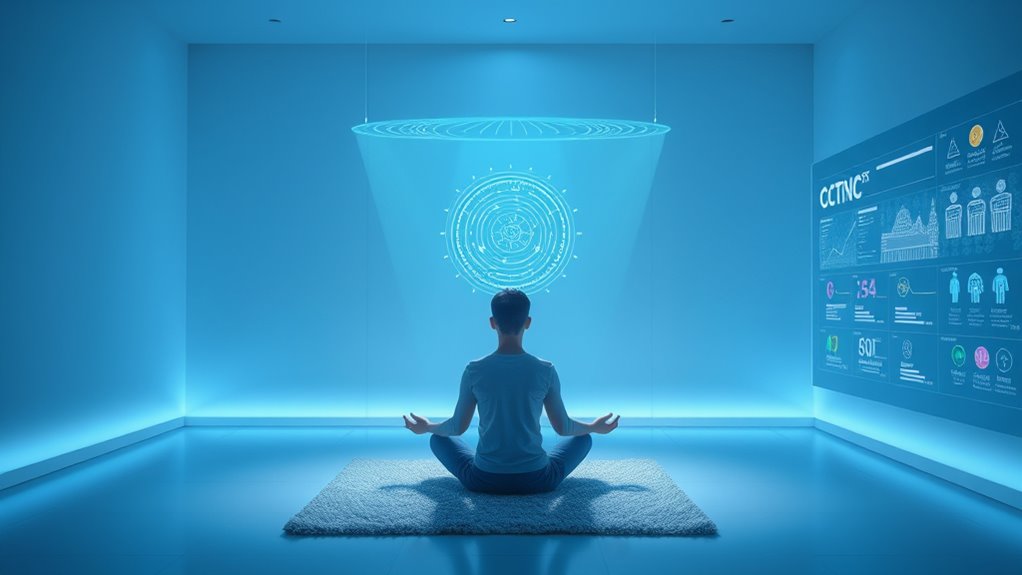
Harnessing data-driven insights and user feedback is essential for evolving mindfulness practices into more effective and personalized experiences. By analyzing user interactions, session outcomes, and engagement patterns, AI systems can identify what techniques resonate most and where users struggle. Incorporating feedback allows you to refine meditation programs, making them more relevant and impactful. You can track trends, such as preferred session lengths or calming strategies, and adapt content accordingly. This continuous loop of data collection and adjustment helps create a tailored journey that responds to your evolving needs. Additionally, understanding regional legal resources can inform how supportive environments are integrated into mindfulness practices. Recognizing cultural considerations ensures that meditation approaches remain respectful and inclusive across diverse user groups. Moreover, leveraging insights from global entertainment industry trends can inspire innovative ways to engage users and enhance the overall experience. Staying informed about family dynamics can also provide valuable context for personalizing mindfulness techniques that address specific emotional challenges. Ultimately, integrating insights and feedback enhances the effectiveness of AI-guided meditation, fostering deeper engagement and better mental health outcomes. It transforms generic approaches into customized experiences that truly support your mindfulness growth.
Voice-Activated and Conversational Meditation Guides

Voice-activated and conversational meditation guides let you meditate hands-free, making it easier to stay focused. They personalize your experience through voice interactions and adjust in real-time based on your mood. This seamless approach helps you connect more deeply with your practice and stay present. Incorporating mindfulness techniques into these guides can further enhance emotional resilience and mental clarity. Additionally, these tools can support your sleep quality by promoting relaxation routines that improve overall well-being. By integrating Bedroom design principles, these meditation guides can be tailored to meet the unique needs of new parents, fostering relaxation and emotional balance during early parenthood.
Hands-Free Meditation Experience
Have you ever wished to meditate without interrupting your flow or needing to touch a device? Hands-free meditation experiences make this possible, letting you focus fully on your practice. With voice-activated guides, you can start, pause, or change sessions effortlessly. Imagine just saying, “Begin meditation,” and the guide responds instantly. These systems also adapt to your environment, offering calming prompts or breathing exercises without manual input. Here’s what makes this experience seamless:
- Voice commands allow fluid control without distractions
- Conversational guides respond naturally, creating a personal connection
- Sensors detect your posture and adjust prompts accordingly
- Hands-free setup means you can meditate anytime, anywhere, even during busy routines
- Incorporating voiceover style enhances the relatability and immersion of these guided experiences
- Such systems often utilize automatic detection technologies to optimize your meditation session based on real-time feedback
This technology keeps your meditation smooth and uninterrupted.
Personalized Voice Interactions
Personalized voice interactions transform meditation by creating guides that speak naturally and respond to your unique needs. Instead of generic prompts, the AI tailors conversations to your mood, preferences, and progress. As you meditate, the system recognizes cues from your voice, adjusting guidance in real-time to deepen your focus or gently redirect wandering thoughts. You can ask questions, request specific techniques, or change the session’s tone, all through natural speech. This interactive approach makes meditation feel more engaging and less robotic, fostering a sense of connection and understanding. By adapting to your evolving state, these voice interactions help maintain your motivation and make each session more effective and personalized. Additionally, integrating advanced technology ensures more accurate responses and seamless interaction, elevating your meditation experience to a new level. This innovation leverages real-time voice recognition to better understand and respond to your spoken cues, making the experience even more intuitive. Moreover, these AI-guided sessions can incorporate natural language processing to better interpret complex or nuanced speech, enhancing personalization. As a result, the system can adapt its responses based on your user feedback, creating a truly tailored experience that evolves with your practice. Ultimately, they create a more intuitive, supportive meditation experience.
Real-Time Mood Adjustments
As your meditation session unfolds, real-time mood adjustments allow the guide to respond instantly to your emotional state, creating a seamless and supportive experience. If you seem tense, the guide might suggest calming breathing exercises. Notice feeling anxious? It could shift to gentle affirmations to ease your mind. When you’re calm, it may introduce deeper meditation techniques. This dynamic responsiveness keeps you engaged and helps you stay aligned with your needs. Additionally, this approach can promote bodily awareness, enhancing your overall sense of presence during the session.
Virtual and Augmented Reality Enhancements for Immersive Experiences

Virtual and augmented reality technologies are revolutionizing the way you experience mindfulness by creating more immersive and engaging environments. With VR headsets, you can transport yourself to tranquil beaches, lush forests, or serene mountain peaks, making your practice feel more vivid and real. Augmented reality overlays calming visuals and sounds onto your physical surroundings, enhancing focus and relaxation without disconnecting you from your environment. These tools help you deepen your meditation by providing sensory-rich experiences that heighten awareness and reduce distractions. As technology advances, you’ll find increasingly realistic and personalized environments that adapt to your mood and preferences. VR and AR make mindfulness practice more accessible, engaging, and effective, helping you cultivate presence with heightened clarity and ease.
The Role of Wearable Devices in Monitoring and Guiding Practice

Wearable devices are transforming how you monitor and refine your mindfulness practice by providing real-time feedback and guidance. These gadgets track your heart rate, breathing patterns, and movement, helping you stay aware and centered. As you practice, they offer instant insights, so you can adjust your focus or posture immediately. This personalized feedback keeps you engaged and motivated to improve.
Here are four ways wearables enhance your mindfulness journey:
- Real-time alerts help you recognize signs of distraction or stress early.
- Progress tracking shows your improvement over days or weeks.
- Guided prompts provide gentle reminders to refocus when your mind wanders.
- Biofeedback data deepens your understanding of how your body responds during practice.
With wearables, mindfulness becomes more precise, personalized, and effective.
Challenges and Ethical Considerations of AI in Mindfulness
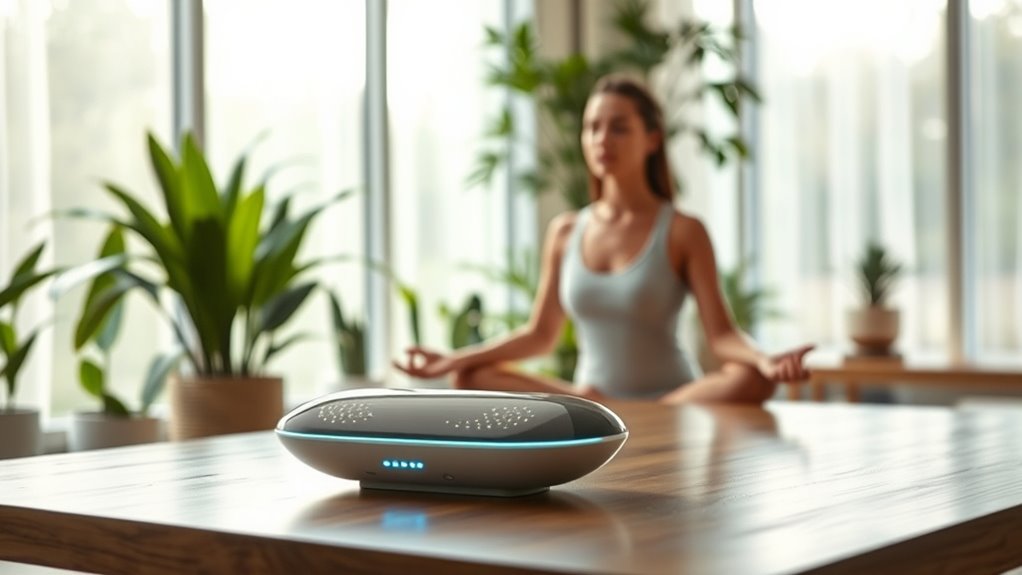
While AI has the potential to deepen and personalize your mindfulness practice, it also raises significant challenges and ethical concerns. Privacy is a major issue; sensitive data from your meditation sessions could be misused or inadequately protected. There’s also the risk of over-reliance on technology, which might hinder genuine self-awareness and emotional resilience. Biases embedded in AI algorithms could lead to unfair or inaccurate guidance, disproportionately affecting certain groups. Additionally, the commercialization of mindfulness raises questions about authenticity and commodification, potentially undermining the practice’s core values. As you incorporate AI tools, it’s pivotal to remain aware of these issues, ensuring that technology supports your well-being ethically and responsibly without compromising your privacy or the integrity of your mindfulness journey.
Future Innovations and Emerging Trends in AI-Guided Meditation
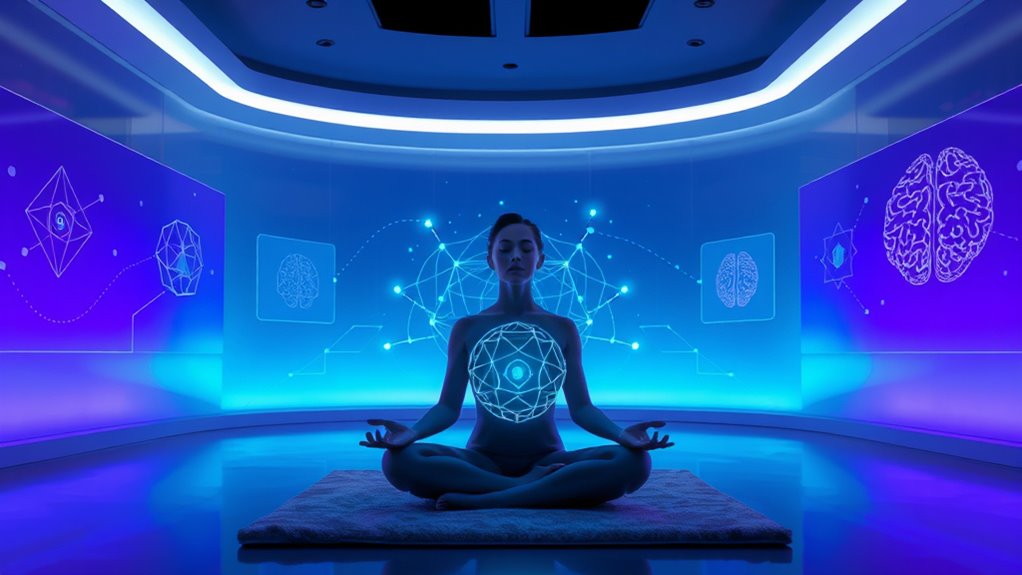
As AI continues to evolve in the domain of mindfulness, innovative tools are emerging that promise to transform your meditation experience. These advancements aim to make your practice more personalized, engaging, and effective. Here are some exciting trends to watch for:
- Emotionally intelligent apps that adapt sessions based on your mood, helping you navigate stress or anxiety more effectively.
- Biofeedback integration using wearables to provide real-time insights into your physiological state and guide relaxation.
- Virtual reality environments that create immersive, calming worlds tailored to your preferences, deepening your focus.
- AI-powered community support platforms connecting you with others for shared mindfulness journeys, fostering connection and accountability.
How AI Is Making Mindfulness More Accessible Globally

Have you ever wondered how AI is breaking down barriers to make mindfulness practice accessible for people everywhere? AI-powered apps and platforms translate complex techniques into simple, personalized experiences, no matter where you are. They remove language barriers by offering content in multiple languages, ensuring more people can engage with mindfulness. AI also adapts to your needs, providing real-time feedback and tailored sessions based on your stress levels or mood. Rural communities, busy professionals, and those with disabilities benefit from these innovations, as they can practice anytime without needing a local instructor or expensive classes. By leveraging data and machine learning, AI makes mindfulness more inclusive, helping millions worldwide cultivate calm, focus, and emotional resilience. It’s transforming mindfulness into a truly global movement.
Frequently Asked Questions
How Secure Is My Personal Data in Ai-Guided Meditation Apps?
You might wonder how secure your personal data is in AI-guided meditation apps. These apps often collect sensitive information like your mood, habits, and preferences. While many use encryption and strict privacy policies, there’s still a risk of data breaches or misuse. To stay safe, read privacy policies carefully, choose reputable apps, and limit the amount of personal info you share. Always stay cautious with your data.
Can AI Meditation Tools Replace Traditional Meditation Teachers?
You wonder if AI meditation tools can replace traditional teachers, but consider this: can a digital guide truly understand your unique feelings, adapt to your needs, or offer the human connection you crave? While AI provides convenience and consistency, it lacks the empathy, intuition, and personal touch a skilled teacher offers. So, instead of replacement, see AI as a supportive partner, complementing your journey, not substituting the human experience.
What Are the Potential Biases in Ai-Driven Mindfulness Recommendations?
When considering biases in AI-driven mindfulness recommendations, you should recognize that algorithms can reflect existing societal biases, favoritism, or cultural assumptions. These biases might lead you to receive recommendations that don’t suit your personal background or needs. You need to be aware that AI systems can inadvertently reinforce stereotypes or overlook individual differences, affecting the effectiveness of your mindfulness practice and potentially limiting its inclusivity and relevance for diverse users.
How Accessible Are AI Meditation Technologies for People With Disabilities?
You might wonder how accessible AI meditation tools are for people with disabilities. Many platforms endeavor to include features like voice commands, screen readers, and customizable interfaces, making meditation more inclusive. However, accessibility varies widely, and some users still face barriers due to design gaps. To improve, you should look for technologies that prioritize universal design, ensuring everyone can benefit from AI-guided mindfulness practices.
Will Ai-Guided Meditation Apps Be Regulated for Quality and Safety?
You’re wondering if AI-guided meditation apps will face regulation for quality and safety. It’s likely, as governments and industry bodies recognize the importance of protecting users from misleading claims and potential harm. Regulations may focus on ensuring accurate information, data privacy, and accessibility standards. As user demand grows, expect oversight to improve, helping you trust these tools more confidently and safely in your mindfulness journey.
Conclusion
As AI continues to revolutionize meditation, you can experience more personalized, accessible, and immersive mindfulness practices than ever before. Imagine a busy professional using an AI-guided app during a hectic day, finding instant calm and clarity. While these innovations hold incredible promise, remember to stay mindful of ethical considerations. Embrace the future of meditation, knowing that technology can help you cultivate peace and resilience wherever you are.

